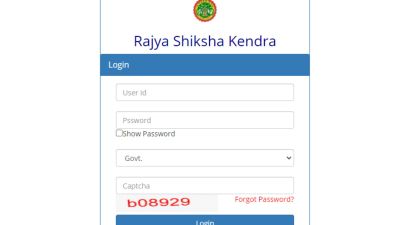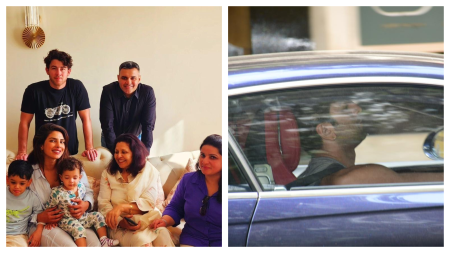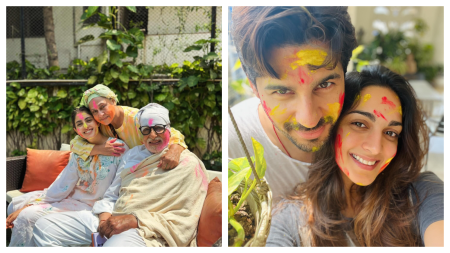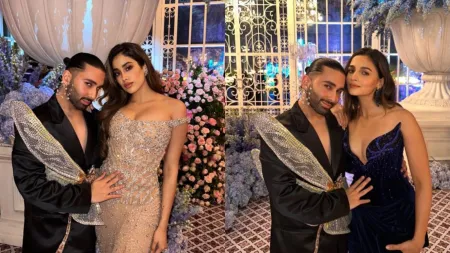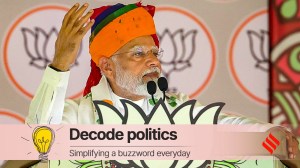- India
- International
Song of the Month: In praise of Gulzar’s Tujhse naaraz nahin and the puzzling joys of life
Penned and composed by the indomitable Gulzar-RD Burman team, "Tujhse naaraz nahin zindagi" from Masoom (1983) plays out in two different versions (Anup Ghoshal and Lata Mangeshkar), suggesting the helplessness of a father on one hand and narrating the emotional state of a woman dealing with her husband's illegitimate child, on the other.
Shekhar Kapur’s first film, Masoom, starts with a dedication to Guru Dutt and Geeta Dutt. Barely minutes go by when we see a playful pug running amok in the house. He jumps up a table and accidentally breaks a framed family photograph. This might be a useful metaphor for things to come, a way for director Shekhar Kapur to drop a well-timed bomb, creating havoc in the life of a perfect Indian family. Just like the splintered shards of the family photo frame lying on the floor, housewife Indu’s (Shabana Azmi) life is about to be shattered. Her domestic bliss will be confronted with an uncomfortable reality: her husband’s illegitimate son. That’s the premise of Kapur’s unconventional debut. Released without much ado in 1983, Masoom is based on Eric Segal’s Man, Woman and Child and stars two of India’s finest parallel cinema stalwarts. Naseeruddin Shah, who plays architect DK Malhotra, was already a well-regarded talent having won the prestigious National Award for his visually impaired turn in Sparsh in 1980. He was joined by his Sparsh co-star in Masoom where the strikingly beautiful Shabana Azmi essays his wife who, through the course of the film, will be forced to address the elephant in the room. Well, to be sure, it’s not an elephant so much as an angelic little boy. In reality, that cuddly bundle of joy grew up to be Jugal Hansraj, whose career, in hindsight, unfortunately peaked with Masoom. The light-eyed Hansraj plays Rahul, DK Malhotra’s illegitimate child. That curious fate also makes him, quite legitimately, the title’s innocent victim – an endlessly suffering kid waiting to be accepted into the fold.
“Will I get to call you ‘papa’?” the adorable Rahul, who has taken a liking towards DK, asks him when they are in Nainital for his admission in a boarding school. Rahul doesn’t yet know that DK is his father. The one man he’s been anxiously looking for, all his life. For DK, Rahul’s seemingly innocent questions have deeply complicated answers. That’s perhaps why director Shekhar Kapur and the film itself, are forced to rely on Gulzar’s lyrical wisdom. As the father-son pair begin to enjoy the newly-developed bond, it’s a timely cue for Kapur and Gulzar to throw in the film’s definitive anthem. Sung by Anup Ghoshal and composed by the legendary RD Burman, the Gulzar-penned “Tujhse naaraz nahin zindagi” is Masoom’s musical heartbeat. To Hindi film music buffs, it represents – ranked alongside Ijaazat, Parichay, Ghar, Aandhi, Libaas and Kinara – the creative zenith of the duo’s long and fruitful partnership.
Considered one of Gulzar-RD Burman’s greatest albums, Masoom features a near-perfect soundtrack. It’s hard to think of another Hindi film music catalogue that thrums with such timeless classics as “Do naina aur ek kahani”, “Lakdi ki kaathi”, “Huzur iss qadar bhi na” and of course, the two versions of “Tujhse naaraz nahin zindagi”. For fans of Gulzar-RD, they are a match made in heaven. Life, in fact, came a full circle for Gulzar with his collaboration with RD Burman, or Pancham as he was popularly known. Gulzar’s very first song “Mora gora ang laile” was for SD Burman in Bandini in 1963 but his best works would come only decades later in the 1970-80s with SD’s talented son. The two remained lifelong friends until RD Burman’s death in 1994. Gulzar seldom worked without Pancham. Except in Mere Apne (Gulzar’s first directorial venture where he joined hands with Salil Choudhury) and Mausam (Salil Choudhury-Madan Mohan), Pancham was always his first choice. It was only after Pancham’s death that Gulzar switched loyalties to Vishal Bhardwaj, from Maachis (1996) onwards to be more specific.
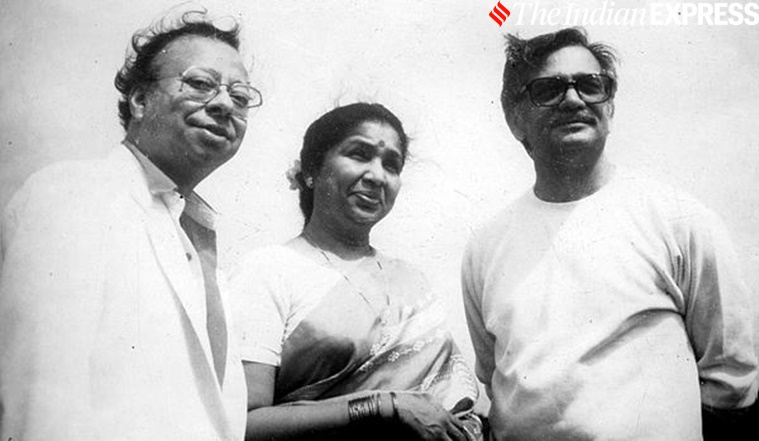 Considered one of Gulzar-RD Burman’s greatest albums, Masoom features a near-perfect soundtrack. Here he is seen with Burman and Asha Bhosle. (Photo: Express Archive)
Considered one of Gulzar-RD Burman’s greatest albums, Masoom features a near-perfect soundtrack. Here he is seen with Burman and Asha Bhosle. (Photo: Express Archive)
Ode to life’s sly twists

Of all the songs from the Gulzar-RD Burman canon, “Tujhse naaraz nahin zindagi” is undisputedly one of their most commercially as well as critically successful creations, as evidenced in its enduring popularity with the masses. Like most of their songs together, it stands out for its evocative imagery and catchy tune. Written in Gulzar’s highly distinctive style favouring abstraction over direct expression, “Tujhse naaraz nahin zindagi” is an ode to life’s seemingly inexhaustible potential to confound and present humans with sticky situations that do not have clear or immediate solution. More often than not, we don’t even know how to deal with them. Neither does DK. The evocative lyrics, with couplets like “Zindagi tere gham ne humein, rishtey naye samjhaye/Mile jo humein dhoop mein mile, chhaon ke thande saaye” reflect DK’s inner thoughts as he grapples with his new reality, the surprising twist that life has dealt him. He is now a father of not just two daughters (one of them played by child artiste Urmila Matondkar) but also a son and the song captures his conflicting emotional state, triggered by Rahul’s growing fondness for him as against his own inability and sheer helplessness to accept him publicly.
Few Hindi films of the 1980s dealt with such a difficult-to-digest subject as Masoom. Fewer still would have tackled it as maturely and in such a subtle manner. When DK breaks the tricky news of Rahul’s existence, the result of a brief affair with an artist (an ethereal Supriya Pathak as blink-and-miss Bhavna) he had met at a class reunion in Nainital, director Shekhar Kapur eschews the melodrama – a necessary Bollywood concomitant of the time – and cuts straight to a more realistic and instinctive approach. How would a woman who has just discovered her husband’s long-lost affair and to make matters even worse, a child from the extramarital relationship, react? Azmi’s Indu reacts the way you imagine most woman would. She howls, at first believing it to be untrue. In fact, she brushes it off as a joke. “Oh, DK, please stop it,” is all an emotional Indu can muster. When DK tells her that Bhavna is dead, she’s relieved. But on hearing about a son from that relationship, Indu cannot control herself. “Don’t say that,” she pleads, bursting into tears. The film’s most critical scene is bereft of loud drama and the world-is-crashing background score typical of 1980s mainstream Hindi cinema. But then, Masoom is no ordinary film. The famously acerbic Naseeruddin Shah once joked that all the parents took their kids to see Masoom because they thought it was a children’s film! If anything, it’s a children’s film for adults.
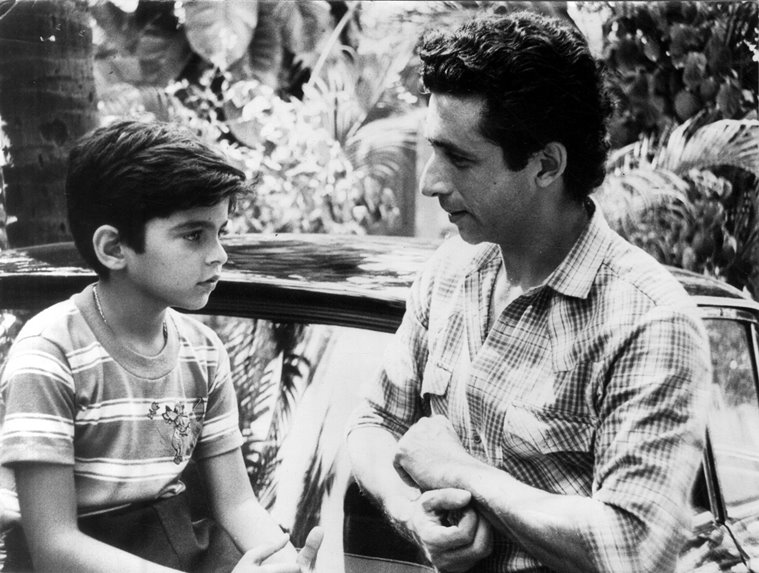 Few Hindi films of the 1980s dealt with such a difficult-to-digest subject as Masoom.
Few Hindi films of the 1980s dealt with such a difficult-to-digest subject as Masoom.
Credit must go to first-timer Kapur’s understated direction. Masoom’s most emotionally challenging moments carry a whiff of lived reality: DK’s confession looks sincere and he deals with the situation with startling honesty while Indu’s reaction to it is in tune with her character. Kapur’s narrative takes a sharp turn from this point, a departure that will be defined by Rahul’s ‘he’s here to stay’ presence. Naturally, he is unwanted in the Malhotra household. But as the drama unfolds, the audience will witness Indu’s softening stand towards him. A scene between Indu and her friend Chanda (Tanuja, in a fine guest appearance) is particularly revealing to that end and might have worked as a catalyst. Chanda has just rekindled with her husband. When her son held her hand and asked her to return home, she couldn’t resist any longer. “If I were just a woman it would have been fine. But I am a mother, too,” Chanda explains, adding, “Jab maa ki bhavna jaagti hai, uske saamne aurat nahin khadi reh sakti.”
Through its poetic ordinariness and a remarkable grip over intricate relationships like marriage and parenting, the film shows that a woman cannot forgive but a mother can – and must. Here’s, then, the most remarkable thing about Masoom. It starts off as a father-son saga but in the end, it’s the mother who holds the key to how this story will end. Masoom desperately depends on Indu’s kindness, for her to forget and forgive and accept Rahul as her own son. It takes Rahul’s brief absence (as he runs away) for Indu to realise his true worth. Is it his fault that he was born under such circumstances? As for Rahul, all he wants is to hear those golden words from his biological father: “I am your dad.” It is at this crucial juncture, with Rahul returning home safe, that Kapur plays the Lata Mangeshkar version of “Tujhse naaraz nahin zindagi” once again proving that in Eternal-Mother Lata that Bollywood trusts! Shot on Indu and Rahul, the female iteration of the same song expresses a mother’s welcoming embrace and doubles up as the ultimate catharsis for a previously insecure Indu.
Don’t mess with Gulzar
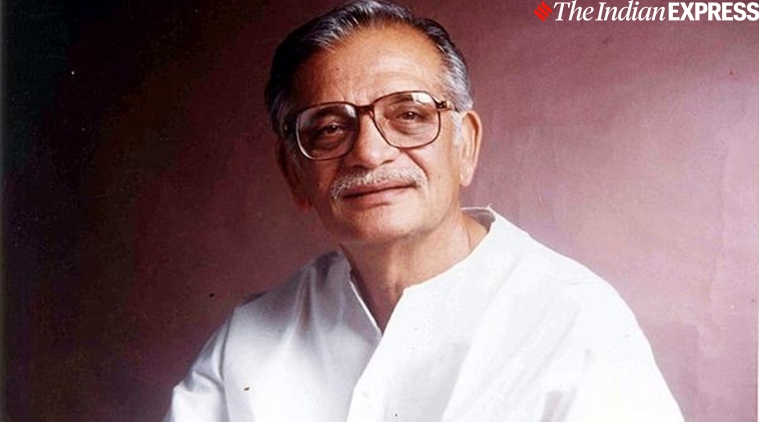 Gulzar-penned “Tujhse naaraz nahin zindagi” is Masoom’s musical heartbeat. (Photo: Express Archive)
Gulzar-penned “Tujhse naaraz nahin zindagi” is Masoom’s musical heartbeat. (Photo: Express Archive)
Masoom star Naseeruddin Shah is not particularly charitable when it comes to praising friends or films all that easily. On the contrary, he’s often critical of his own work. Which is why it’s surprising to read that he has described Masoom as a project that was a “total joy” to work on. Initially though the thespian was reluctant, given that it was the director’s maiden effort at filmmaking. “I went into Masoom with an attitude of great patronage because Shekhar Kapur at that time was nothing but a failed actor,” Shah told Times Now. “But with the very first shot that was taken in that movie, I revised my opinion of Shekhar Kapur as a filmmaker and realised that I was in very safe hands and that this was going to be a very wonderful movie.”
In 2017, Shekhar Kapur went down memory lane, reminding Twitteratis that before Masoom he had no prior filmmaking experience. Masoom was “pure instinct,” he tweeted. The 73-year-old Kapur was once a successful chartered accountant in London. But in a way, filmmaking was always in his blood, thanks to uncles Chetan, Dev and Vijay Anand who all, in their own different ways, went on to forge a very modern style of Hindi films. Even today, their rom-coms and noir capers are admired for their evergreen songs, shot with imaginative force and rather unconventionally by Bollywood standards. Masoom is surely the kind of superlative soundtrack that would have made the musically-minded Anand Bros proud.
Besides the songs, Gulzar also wrote the film’s screenplay and dialogue. In a conversation with Nasreen Munni Kabir published in the book ‘In the Company of a Poet’, Gulzar mentioned that in a bid to adapt Eric Segal’s Man, Woman and Child in an Indianised context, he had dropped the novel’s movie-world setting and instead decided to root it in Delhi and Nainital. As for why his lyrics often have a conversational feel, he explained to Kabir, quoting TS Eliot, that “the best form of poetry, especially when talking of blank verse, is when it reaches the level of conversation and talks to you.” In another interview, this time with Livemint, he related a particularly amusing anecdote where he spoke of having creative differences with the young Shekhar Kapur. Apparently, Kapur wasn’t happy with “Lakdi ki kaathi” and believed to have approached the veteran lyricist with a suggestion to rework it. “Shekhar was adamant on adding a line, “Bibiji tea pee ke aayi.” I didn’t agree and left the song midway,” Gulzar told Livemint in 2016. “Shabana (Azmi) fired him and told him, “Bachchon ke gaanon pe kabhi Gulzar se panga mat lena (don’t ever mess with Gulzar when it comes to children’s songs).”
Listen to “Lakdi ki kaathi” and you will see why. Like many Gulzar lullabies, it bears its writer’s special stamp. On surface, “Lakdi ki kaathi” looks like a child’s play but dig deeper and you will find buried inside it a thought-provoking composition, with unbelievable layers and richness that belies the expectations of a children’s ditty. In a song all about children and the joys of childhood, the inimitable Gulzar manages to drop covert tributes to Mirza Ghalib (one line from the song goes, ‘Ghoda apna tagda hai dekho kitni charbi hai/ Chalta hai Mehrauli mein par ghoda apna Arabi hai) but that’s for another day. For now, let’s savour “Tujhse naaraz nahin zindagi” and its celebration of life’s wondrous and often, puzzling joys.
Photos
Apr 23: Latest News
- 01
- 02
- 03
- 04
- 05











